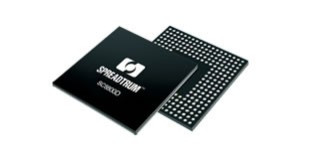Key Takeaways from Spreadtrum Call over Muddy Waters Questions

Spreadtrum Communications, Inc (NASDAQ: SPRD) held a conference call to address questions raised in Muddy Waters’ open letter.
Jefferies said Spreadtrum's management provided great detail on its history, management & auditor changes, product mix, income taxes, the MobilePeak acquisition and accounting practices.
We remain positive on Spreadtrum's fundamentals, and believe the company is well positioned ahead of the new product cycle and will continue to gain market share, said Branden Chen, an analyst at Jefferies.
Chen said he was very encouraged by management commentary, including: reiteration of full confidence in its accounting and business practices; management changes were due to personal reasons; auditor changes were due to periodic review of service providers, not issues in accounting and internal controls; and RF transceivers and baseband were sold mostly in bundles in 2010.
In addition, Chen said the management commentary also included: low tax position due to a financial loss carryover from previous years; quality inspection program increases customers confidence and deferred revenue recognition is compliant under U.S. GAAP; adequate inventory accounting procedure is being carried out, including physical accounts and confirmation with customers regarding shipments; and reviewed 3 acquisition targets and determined MobilePeak was the best match.
Chen said the company's management pointed out that the significant increase in deferred costs and advances from customers were due to market share gain and revenue growth.
The company highlighted 100 percent revenue associated with deferred costs in the quarter-end would be recognized as revenue in the following quarter and this practice is compliant under U.S. GAAP.
Chen believes deferred cost is indicative of revenue visibility for next quarter. In addition, the company may consider shortening the duration of the quality inspection period of 30 to 90 days, as its product quality has demonstrated significant improvement over the past year.
The company announced a quarterly cash dividend of $0.05 per share (or total payout of about $2.45 million) today. In addition, the company had purchased 1.44 million shares under its $100 million repurchase program. Chen believes this is a reflection of management's belief in and commitment to its business.
Previously, Chen said his response to some of the questions raised by Muddy Waters are:
-- Please explain the sales increase in light of the following 2009 management changes? It is well understood among handset supply chain constituents (foundries, independent design houses, handset vendors) that quality issues, product delays, and inadequate customer supports plagued the company in the past.
The increase in sales can be attributed to the company’s favorable pricing, improving product quality and customer support. Chen believes sales cycle is much shorter than 4-9 months and the company was coming off a very low revenue base.
-- Why did Spreadtrum grow so much faster than its competitors in 2010? It should not be a surprise that Spreadtrum is growing faster than its competitors in 2010. Texas Instruments Inc. (NYSE: TXN) exited the GSM baseband business. ST-Ericsson (ERIC) and Infineon were unable to gain any significant wins. In addition, MediaTek admitted losing market share to Spreadtrum.
-- What were 2010 sales of RF transceivers, baseband, and any other products in 2010? This was addressed in the past. Prior to 2010, the company reported RF transceiver and baseband sales in different lines as these products were sold separately. Starting in 2010, the company achieved 100 percent attachment rate for its RF transceivers with baseband and reported the integrated products as bundle semiconductors.
-- If Spreadtrum generated $75.3 million in pre-tax profit in 2010, why didn’t it make any cash tax payments? Spreadtrum reported net income loss in 2008 and 2009 and claimed deduction for those losses in 2010. As such, the company did not make any cash tax payment. The company reported an effective tax rate of about 11 percent in 2010.
-- Why has each of advances from customers and deferred cost become so significant? Chen believes the increase is because Spreadtrum is gaining market share. Due to quality issues in the past, Spreadtrum offers customers an acceptance period to assure its product quality. The company noted the return rate is very low. This policy is a sign of management’s belief in its products and conservatism in revenue recognition, in his view.
-- Why acquire MobilePeak when it appears to be a distressed company? MobilePeak expands the company’s reach into the WCDMA market, which Spreadtrum previously did not address. Chen believes this acquisition accelerates product time to market.
Upon further review of the questions raised in Muddy Waters' open letter, we believe the letter simply rehashes issues that have already been addressed, or raises questions where the answers are obvious to anyone who has been following the dynamics in the 2G baseband market in China, said Chen.
Spreadtrum stock closed Wednesday's regular trading up 10.17 percent at $13.76 on the NASDAQ Stock Market, while in the after-hours the stock rose 0.94 percent to $13.89.
© Copyright IBTimes 2024. All rights reserved.





















